
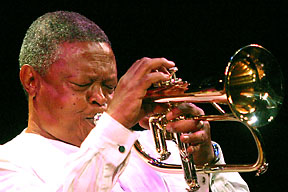 |
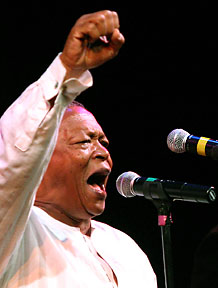 |
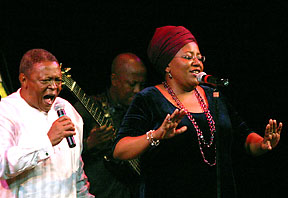 |
|
Story and Photos by Matt Schwenke While the legacy of South African trumpeter, singer, composer and social activist Hugh Masekela, 68, is already starred with poignant events spanning generations-- many can recall the soundtrack for the movement to free Nelson Mendela that he created in the 1987 tune "Bring Him Back Home (Nelson Mandela)," while others remember his 1968 Americanized ooga booga smash hit "Grazin' In the Grass," while still others will recall his collaborations with afrobeat progenitor Fela Kuti in the '70s, who introduced Masekela to the Ghanian band Hedzoleh Soundz, and with Paul Simon in the '80s, as Masekela joined Ladysmith Black Mambazo and other South African musicians in an "illegal" recording of their music-- now, many more generations to come across the globe will have another reason to remember Masekela's legacy as he tours with the Chissa All-Stars, a group of musicians on his recently-founded label, Chissa Records, that showcases the world-class musical talent from his homeland.With approximately 30 shows across a limited number of cities in the U.S. and Canada on his 2008 North American tour (one set of dates as Hugh Masekela's Chissa All-Stars and the other as the Hugh Masekela Quintet), Masekela perhaps revealed his decision to perform in Madison when he told the crowd that Madison's social involvements were among the first in America to pressure the U.S. government to protest the apartheid in South Africa while reflecting on celebrating 14 years of the apartheid's end on April 27 of this year. And subsequently, the most compelling moments of the night would arise out of his tales of struggle, as in "Stimela (The Coal Train)," where Masekela delivered only brief, but astounding, coronet interjections over animated prose and a quiet backdrop by the band in recreating the story and sounds of the trains that brought in thousands of Africans to work under slave-like conditions in South African mines. As the tune grew in intensity, the shrill whistles Masekela emitted in mimicking the trains began to transform into cries of pain, and it was this transformation that makes his sound somehow uniquely universal. Other songs about Darfur and the AIDS epidemic eloquently expressed the emotions involved, without an English insert worked in for translation. But despite the crowd's relatively sessile but rapt attention (Masekela joked early on that the crowd didn't need to act "cool" just because they came all the way from Africa), the night wasn't all so heavy-hearted, as Masekela proved he can not only get down at his age, but can still entertain beyond his musical talent. In Fela Kuti's "Lady," Masekela was comical and dramatic in delivering the role-playing lyrics and fiery horn-- though Masekela's tone is incredibly clean, his adept use of sextuplets create a slightly chaotic sense of energy that sets him apart. And all the while, his Chissa All-Stars proved they deserved to be touring with such talent. The group featured a vast range of vocal talent with diva Sibongile Kuhmalo delivering exquisite afro-pop, jazz scats to scintillating operatic climbs, urban-Zulu singer Busi Moholgo and the young singer Nathi delivering traditional afropop and exceptionally smooth afrojazz style. Also among the talented was musicians was reed player and composer Khaya Mahlangu, who led the band when Masekela let his fellow musicians take over for a few quick breaks, and delivered thought-provoking jazz, in a lyrical, Flecktones sort of style with soprano sax on his own "Rain Dance." Not surprisingly, the musicians were at their most powerful near the end of the show as all 11 got the crowd up and moving in a chant and beat breakdown based off of a traditional calling out of the cops when drinking alcohol was prohibited South Africa. Returning for an encore to the crowd still standing, Masekela remarked, "You're a wonderful audience, and we'd like you all to come with us wherever we play. We just don't want you to bring your weather." (A cold wind blew in off the lake during a snowstorm that night.) Masekela's endearing quality as a human being, mastery of the horn as a musician and knack for entertaining would culminate with his talented cast helping elicit a host of cheers amidst chanting along to his anti-apartheid anthem "Bring Him Back Home" and ending a musical journey into the South African past, present and future while all on one stage. |
 |
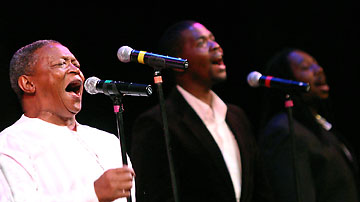
|
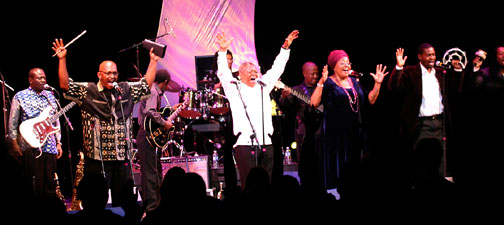

Check out other concert reviews